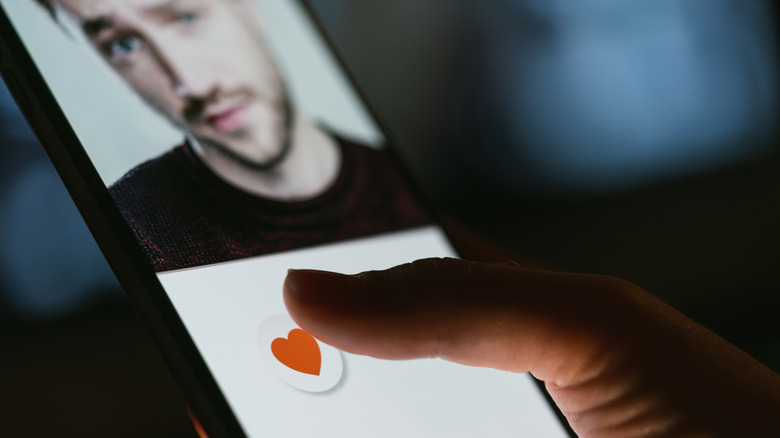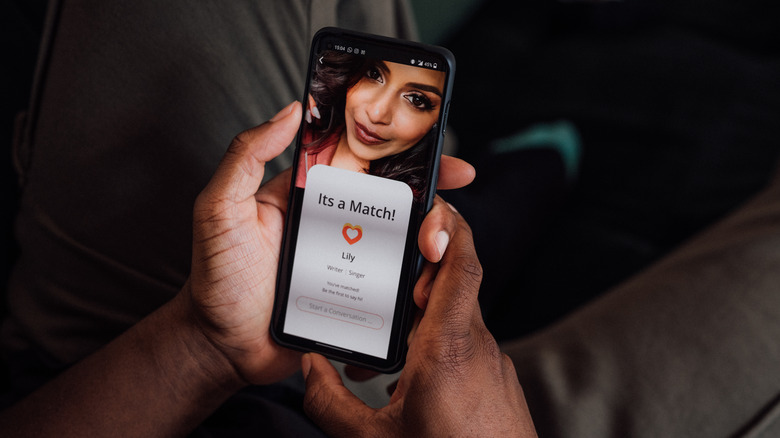The Dating Apps Lawsuit, Explained: Why Hinge And Tinder Are Being Sued
In news that's not totally shocking, Match Group, the parent company of Tinder, Hinge, and OKCupid (among others) is being sued. While one may think that such a suit might be related to not getting enough matches or having been on the apps for years and never once finding love, that's not the case. Instead, the lawsuit is alleging predatory behavior on behalf of Tinder, Hinge, and The League, including creating an addiction to the apps.
According to the class-action lawsuit that was filed by six U.S. men on February 14, 2024, "Match's business model depends on generating returns through the monopolization of users' attention, and Match has guaranteed its market success by fomenting dating app addiction that drives expensive subscriptions and perpetual use." The complaint, which is 58 pages in its entirety, goes on to claim that the apps use features "to gamify the platforms to transform users into gamblers locked in a search for psychological rewards that Match makes elusive on purpose."
Match Group has denied any wrongdoing. In a statement shared to USA Today, a spokesperson for the company said, "This lawsuit is ridiculous and has zero merit...We actively strive to get people on dates every day and off our apps. Anyone who states anything else doesn't understand the purpose and mission of our entire industry." Although the men are seeking $5 million in damages, the real question is this actually going to go anywhere?
The lawsuit claims dating apps are designed to be addictive
This isn't the first time that dating apps have been called addictive. In fact, this lawsuit contains the findings by eHarmony that "nine in ten singles (90%) believe they are 'addicted' to dating apps" and 55% feel they spend too much time on apps. When the results of the survey were released, so was commentary by an expert on the matter. "As technology has become ever more prevalent in our lives we're seeing a new type of internet addiction in the form of dating apps — with users often unaware that they are addicted to them," said cyber psychologist Dr. Martin Graff. Some experts say the reason for this is because the act of swiping on dating apps gives our brain a boost of dopamine. Similar to how casino games work, we keep using them because we're anticipating a reward, but we can't say when it will come because it's up to chance.
Despite this, not everyone is buying the 'addictive' claims. "The lawsuit is a bit absurd, if I'm honest," psychologist and relationship coach Jo Hemmings tells The Washington Post. "Like any app, it's a business; it's there to make money... Shopping apps are designed to keep you shopping. And this is shopping for people."
However, it's worth noting that Tinder's Jonathan Badeen was inspired by Project Pigeon in creating the swiping method. Project Pigeon was an experiment conducted by psychologist Burrhus Frederic Skinner in which he trained pigeons to believe that their incessant pecking would result in the appearance of food. In the hopes of bettering their chances at receiving food, the pigeons devised pecking patterns, just like a gambler would when trying to win. Pecking or swiping to see what you'll get? Not too different in the world of dating apps.
Where the lawsuit stands right now
Lawsuits, especially those of this caliber, aren't taken care of overnight. Although the suit was filed in California, the six plaintiffs are from California, Florida, Georgia, and New York. The lawsuit accuses violation by Match Group under the following acts: California's Consumer Legal Remedies Act, New York General Business Law, Georgia's Deceptive Trade Practice Law, and Florida's Deceptive and Unfair Trade Practices Act. The lawsuit also claims false advertising on the part of Hinge because it's slogan is "designed to be deleted," and raises concerns about negligence in design and "failure to warn."
As of yet, there doesn't appear to be a date set for when all this will play out in court — if it ever does. But even before delving deep into Jonathan Badeen's swiping inspiration, what's readily available does backup some of the claims that are being made: there is a level of addiction and that may have been the intent. It will be interesting to see how things go for the six plaintiffs. If it goes in their favor, it's safe to say that dating apps will never be the same again.


